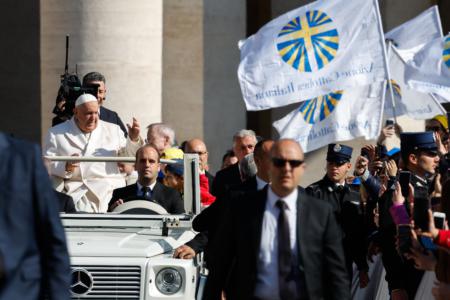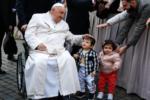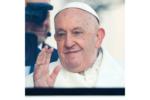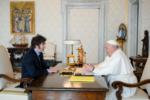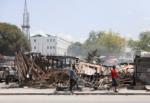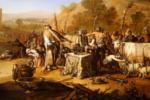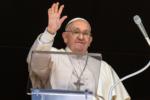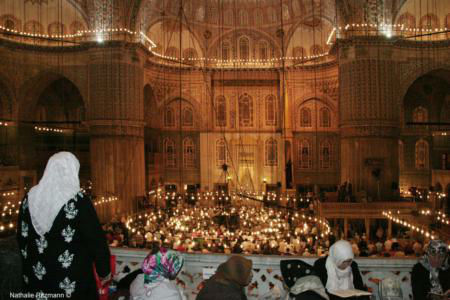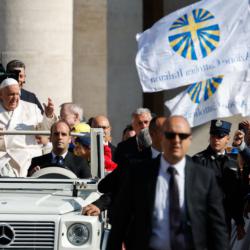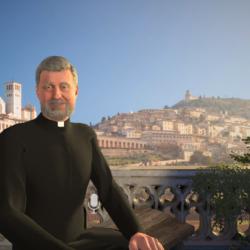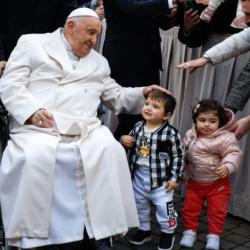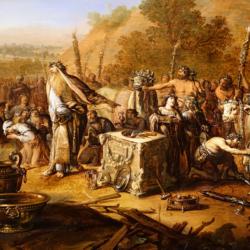Prominent Muslims hope pope's Turkey trip can show Islam's peaceful side
WASHINGTON (CNS) -- Two prominent Muslim religious figures in Turkey welcomed the upcoming visit of Pope Francis to their country, saying they hoped it could shed light on the "peace" of Islam and help change bad images associated with that religion.
At Istanbul's famed Sultan Ahmed Mosque -- often referred to as the Blue Mosque because of the turquoise tiles that adorn the early 17th-century structure -- Ishak Kizilaslan said Muslims welcomed "everyone coming to us in a good way."
Pope Francis' scheduled visit to the mosque is important because the pope will learn from mixing with those worshipping inside that "Islam is always peace," Kizilaslan, the mosque's head imam, or Muslim preacher, told Catholic News Service in a telephone interview Nov. 19.
"I will tell him ... that Islam is peace, the word means peace and submission," Kizilaslan said of what he plans to relay to Pope Francis if he gets the chance during the pontiff's Nov. 29 private stop at the mosque.
"People's eyes all over the world are going to be here, so (Pope Francis) is an important figure to make (Islam) more understandable ... to non-Muslims," the majority of whom, Kizilaslan said, did not "understand Islam in the right way."
He accused Western media of misrepresenting Islam, by linking it with atrocities committed at the hands of groups like the Islamic State group in Iraq, Syria and elsewhere.
"They are not representing the Islamic world," he said of the group, which has claimed responsibility for a vast variety of slayings, including of Christians and other non-Muslim groups, Westerners and Muslim opponents.
"It is much more than religious issues, it is mostly political issues," Kizilaslan said of the killings as well as the conflicts in Iraq and Syria.
Pope Francis plans to spend Nov. 28-30 in Turkey, an officially secular country, made up of mostly Muslims and a minority of Christians, many of whom trace their roots in the country back to biblical times.
Cemal Usak, a Muslim and longtime activist in interreligious dialogue in Turkey and abroad, told CNS that he, too, welcomed Pope Francis's upcoming visit, and he expressed hope the pontiff would use the trip to speak out against current "tragedies" of the region.
"As you know, unfortunately, there are some tragedies in the region, war is going on and religion is viewed as an instrument for war, by ISIS and others," he said, using an acronym for Islamic State, which Turkey considers a terrorist organization.
Pope Francis "can give a message about the conflict, a message not to use religion as an instrument. ISIS has nothing to do with Islam. They are using Islam and religion to justify their bad ideology," said Usak, who helped found KADIP, a Turkish interreligious dialogue platform that promotes Muslim-Christian understanding.
Recalling a papal Mass he attended in Rome last May after which Pope Francis "rushed into the crowd" to mingle with "the needy," Usak said he hoped the pope would similarly use his upcoming visit to call for increased aid to the millions of desperately needy people who have been displaced by the conflicts in neighboring Syria and Iraq.
"Turkey has more than 2 million refugees in the country, and 95 percent of the cost is covered by Turkey. I hope His Holiness will call on other leaders to see the situation ... to work more for needy people (and) asylum seekers," Usak said.
Asked for his assessment of public opinion in general among Turkey's Muslims with regard to the pope's approaching visit, Usak said "there is no negative thinking about Francis in Turkey or the Islamic world," except among "some experts or academics from time to time ... when they remember (retired Pope) Benedict."
Pope Benedict angered millions of Muslims in Turkey and other parts of the world with a 2006 speech he gave in Regensburg, Germany, which they said linked Islam to violence. Many Muslims were further angered in 2011, when Pope Benedict said Middle Eastern Christians were being persecuted.
"Pope Francis is arriving ... with a much more favorable reputation than that of Benedict XVI" who visited Turkey in 2006, in the aftermath of the Regensburg speech, said Dominican Father Claudio Monge, who writes extensively on Islam and has lived and served in Turkey since 2003.
